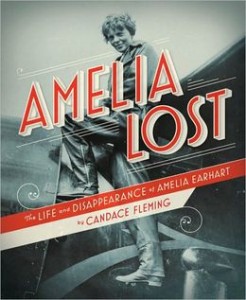 Amelia Lost: The Life and Disappearance of Amelia Earhart
Amelia Lost: The Life and Disappearance of Amelia Earhart is a nonfiction biography of Amelia Earhart. I rarely read nonfiction for fun, but my daughter—who also rarely reads nonfiction—enjoyed this and asked me to review it. It’s an interesting book that provides a nuanced picture of Earhart. She’s certainly not painted as a heroic saint, but neither is she dismissed as overrated.
The book opens near Howland Island as the Coast Guard and others await the arrival of Amelia Earhart, who is flying around the world. Of course she never arrives. Between each chapter telling about her life from childhood on, there’s a bit about the messages from her, the search for her, etc. until the very end when they have to give up. It’s an interesting approach, and it certainly keeps the focus on her famous disappearance, for better or worse.
Like many nonfiction books, there are sidebars containing information that didn’t really fit in the text but still adds to the overall topic. That’s fine—I kind of like sidebars. But, like too many nonfiction books, the sidebars often show up in places that make them difficult to read without either bookmarking them and returning later or taking a big break in the midst of text that’s moving along nicely. The worst are the ones where you have to turn a page to finish reading a sidebar. It’s a common complaint of mine in on fiction books—this book is no worse than most. But my daughter also mentioned being bothered by it before I had had the chance to mention that it bothers me. It’s one of those things I wish more nonfiction book designers would pay close attention to.
SPOILER ALERT: Things you might want to know before suggesting this to your kid
20/20 Hindsight
One of the main points of the book is that the tragedy of Earhart’s disappearance was probably avoidable at many points. It doesn’t so much focus on the “What could have happened?” question as the “What could people have done differently to get a different outcome?” I found it kind of depressing, but informative.
Alcohol
Earhart’s father starts drinking, becomes angry when he’s drunk, scares his girls, loses his job, and pretty much messes up what had been a very happy childhood. Eventually, Earhart’s mother leaves him and takes the girls.
There’s an alarming amount of drinking and flying. One of the navigators and one of the pilots that Earhart flies with tend to drink in excess. For the pilot, Earhart gives him tons of coffee and puts him in the cockpit. The navigator has a reputation for drinking that has resulted in losing several jobs. Earhart doesn’t hesitate to hire him—she’s dealt with drunks before.
Infidelity
When Earhart meets George Putnam, her future husband, he’s already married. This apparently matters to her to some extent—in fact, she dedicates a book to his wife—but eventually George’s wife realizes that she’s lost her husband to Amelia, and she leaves.
Publicity Trumps Talent
It’s not that Amelia Earhart wasn’t an amazing person, but there were a lot of fliers—male and female—at the time, and she comparatively didn’t stand out as particularly talented. But her husband was a publicist, and he knew how to build her brand. Sometimes this meant some underhanded tactics, like convincing news networks to cancel interviews with a British female flier to instead interview Earhart. Flights cost money, and Putnam and Earhart did what it took to earn money to keep funding flights—some people were disappointed to learn that some flights were backed for commercial purposes rather than for love of flying or to break new ground.
The book suggests that, while her contributions were significant, she wouldn’t be remembered nearly so well if she hadn’t disappeared mysteriously.
Sexism
There’s no question that Earhart broke new ground for women. Even as a young girl, she refused to be told that she couldn’t do things because she was a girl. Her mother was supportive: there are pictures of her and her sister wearing pantaloons—kind of shocking and ground-breaking for the time.
She wasn’t perfect, and she may not have even been a particularly talented flier. But Amelia Earhart certainly expanded views of what a woman could do, and she inspired many girls and women to move beyond the roles society ordained for them.
Recommendation
I appreciated the balanced and nuanced take on a famous figure. Like most short biographies, it’s certainly not complete. But there are a lot of resources in the back for anyone who might want to learn more. It’s a good overview and easy to read. It’s suitable for precocious readers (maybe 9 and up—an ability to realize shades of gray is probably useful) and for reluctant readers.
Amelia Lost: The Life and Disappearance of Amelia Earhart by Candace Fleming
Published in 2011 by Schwartz & Wade Books
Read my daughter’s school library book





Speak Your Mind